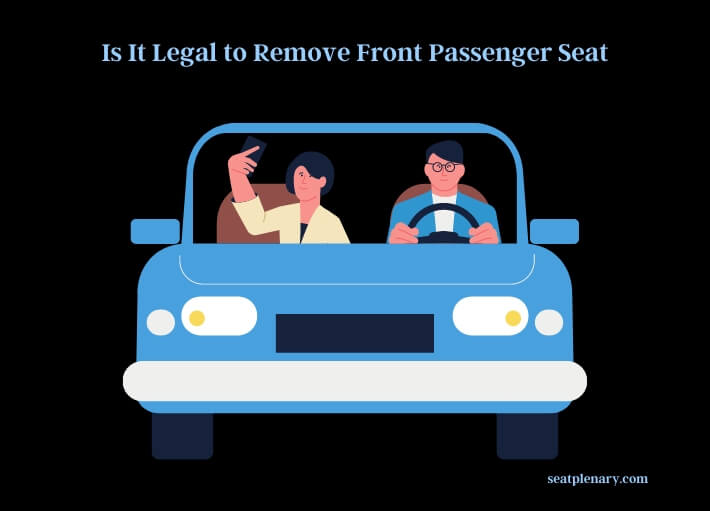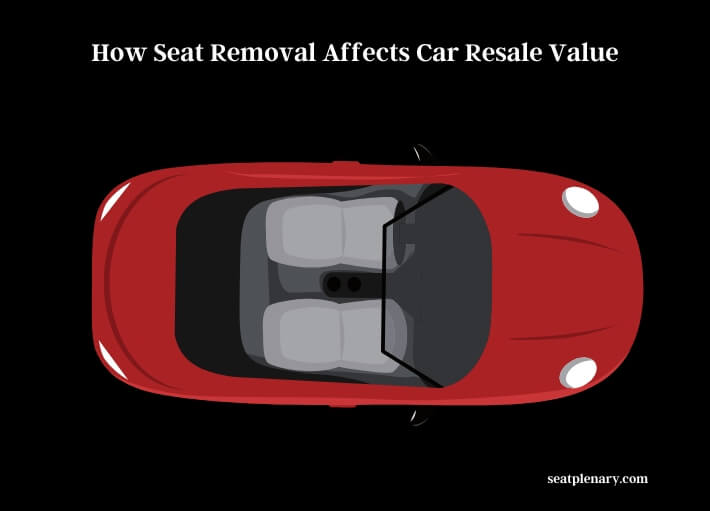Greetings, car enthusiasts! Today, we are scratching beneath the surface of a topic that has recently sparked many heated debates in our community: “Is it legal to remove the front passenger seat?” It may seem like a no-brainer for some, but when you start digging into it, you’ll find a rabbit hole full of legislation, safety concerns, and insurance implications. Buckle up, folks – we’re in for a ride!

Is It Legal to Remove Front Passenger Seat?
First off, let’s answer the burning question – is it, in fact, legal to remove the front passenger seat from your vehicle? Well, the answer is not as straightforward as you might think. It largely depends on local laws and regulations, which vary significantly from state to state and country to country. In some regions, it may be perfectly legal, while in others, it could be a serious infraction. Therefore, before making any modifications, it’s essential to familiarize yourself with your local law.
Safety Concerns: A Foremost Priority
There’s more to this debate than legality. Safety is paramount when it comes to vehicle alterations. It might be a fun thought to remove the front passenger seat for some extra space or unique custom look, but you must consider the safety implications. Car manufacturers design their vehicles with specific safety standards in mind, and altering that could jeopardize your safety and that of your passengers.
Understanding Vehicle Design and Safety Features
Cars are engineered masterpieces, with every part, big or small, serving a particular purpose. The front passenger seat isn’t just there to hold your co-pilot. It plays a crucial role in maintaining the vehicle’s balance, especially during emergency maneuvers. Plus, airbags and seatbelts are designed for a specific seating arrangement.

Implications for Insurance
Altering your vehicle could also have implications for your car insurance. Depending on your policy, removing the front passenger seat may void your coverage. In the event of an accident, the insurance company might refuse to cover damages, leaving you to foot the bill.
Weighing the Practicality
As with any other car modification, removing the front passenger seat might seem appealing for some. You might think of the extra space for larger cargo, or perhaps you fancy a minimalist, single-seater ride. But it’s crucial to weigh the pros and cons before making such a decision.
Legal Requirements for Seats
Contrary to popular belief, the law does require cars to have a specific number of seats. However, this requirement mostly applies to commercial vehicles like taxis and buses. For private vehicles, the rules can be a bit more flexible.
How Seat Removal Affects Car Resale Value
Let’s not forget about resale value. Removing the front passenger seat could drastically affect your car’s resale value, as most buyers prefer a vehicle in its original, unmodified state.

The Power of Customization: Personal Preferences vs. Legal Boundaries
Car customization is all about freedom and self-expression. Whether it’s a souped-up engine, a custom paint job, or a totally revamped interior, modifications make your vehicle uniquely yours. But where should we draw the line between personal preferences and legal boundaries?
Your Car, Your Responsibility
At the end of the day, it’s your car, and you have the right to modify it as you see fit. But remember, with great power comes great responsibility. Keep in mind that your decisions could have serious consequences, not just for you, but also for others on the road.
Seeking Professional Guidance
Before taking a wrench to your car, it’s wise to seek professional guidance. A reputable car modification expert or a knowledgeable lawyer can provide the advice you need, saving you from potential legal trouble down the line.
The Ultimate Question: Is It Worth It?
At this point, you might be asking yourself, “Is all this hassle worth it?” Well, that’s a question only you can answer. It all comes down to what you value most – your creative expression, your comfort, or your compliance with the law and safety standards.
What are the Legal Implications of Removing the Front Passenger Seat?
When considering the legal implications of removing the front passenger seat, it’s important to make sure that the importance of student seating is not overlooked. Safety regulations and laws may require proper seating arrangements for students in vehicles, so it’s crucial to research and understand the legal ramifications before making any changes.
FAQs
Can removing the front passenger seat affect my car’s performance?
Yes, it can. Cars are engineered with a specific weight distribution in mind, and removing the front passenger seat could affect that balance.
Will my insurance company cover damages if I have removed the front passenger seat?
It depends on your insurance policy. Some insurers might refuse to cover damages on a modified vehicle.
Can I reinstall the front passenger seat if I change my mind?
Yes, you can, but it’s recommended to have this done professionally to ensure the seat and safety features are properly installed.
Can I be fined for removing the front passenger seat?
It depends on your local laws. In some places, such modifications are illegal, and you could face a fine.
Is it safer to drive without a front passenger seat?
No, it isn’t. The front passenger seat plays a vital role in the car’s safety features and balance.
Can I remove the front passenger seat of a rented or leased vehicle?
Most rental or lease agreements prohibit making modifications to the vehicle, including removing seats.
Conclusion
The journey to answer the question, “Is it legal to remove front passenger seat?” took us down many roads. We uncovered layers of legal implications, safety concerns, insurance nuances, and practical considerations that all vehicle owners should keep in mind before deciding to make this modification. While it’s crucial to remember that your car is an extension of your personality, it’s equally important to prioritize safety and legality over personal preferences.
So, is it legal to remove the front passenger seat? The answer lies in your local laws, your commitment to safety, and the terms of your insurance policy. But remember – there is no freedom of expression without responsibility. So, make sure you’re well-informed, prepared, and ready to accept the consequences of your modifications.
Read more:
